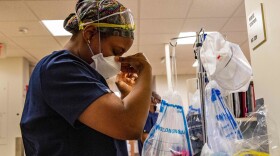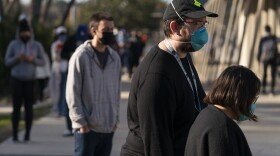The omicron variant has led to a surge in COVID-19 infections in Texas as the state’s nursing workforce is facing infections of their own, as well as months of people retiring or quitting.
On Wednesday, data from the Texas Department of State Health Services showed more than 61,000 newly confirmed cases in Texas and about 689,000 estimated active cases. On the same day, hospitals were reporting about 11,500 hospitalizations of people with COVID.
“Many are leaving the profession. Some are taking a break and plan to come back. Some are leaving entirely because they feel they just can’t do it anymore.”Cindy Zolnierek, CEO of the Texas Nurses Association
Cindy Zolnierek, a registered nurse and the CEO of the Texas Nurses Association, said this is a stressful time for nurses, particularly those who have been on the frontline of the pandemic.
“I think health care workers are bracing for what happens next as omicron reaches its peak,” she said. “They’ve seen several waves and the feeling is like, ‘Is there no light at the end of the tunnel?’”
Zolnierek said this prolonged period of stress and burnout has thinned out the nursing workforce in Texas.
“Many are leaving the profession,” she said. “Some are taking a break and plan to come back. Some are leaving entirely because they feel they just can’t do it anymore.”
Even before the pandemic, a 2017 workforce study published in the Journal of Nursing Regulation expected a shortage of nurses due to an aging workforce, as well as burnout.
Zolnierek said more needs to be done to “support nurse well-being” through this time — including ensuring nurses take breaks throughout the day, as well as possibly adjusting shift lengths for some nurses.
“Hopefully we have learned that nurses are people,” she said. “We are human first. We have a breaking point.”
























